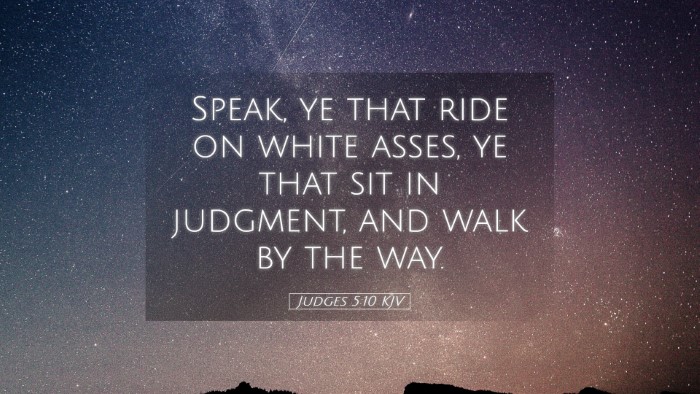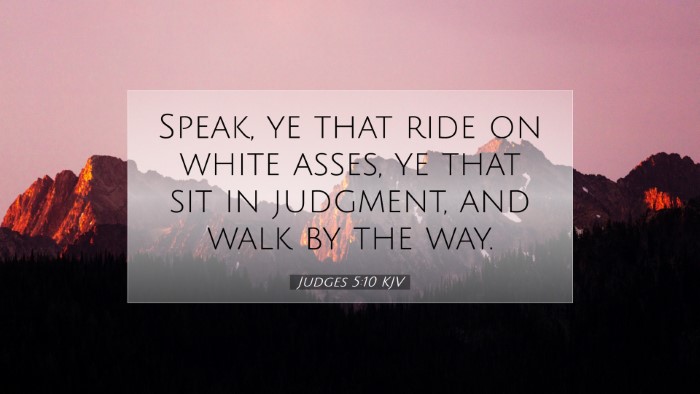Bible Commentary on Judges 5:10
Judges 5:10 states, "Speak, ye that ride on white asses, ye that sit in judgment, and walk by the way." This verse is part of the Song of Deborah, and commentary reveals deep insights regarding the social and spiritual conditions of Israel during this period. In this context, it serves as an exhortation to those in positions of authority and influence. Below, we delve deeper into the various interpretations and theological implications derived from prominent public domain commentaries.
Contextual Overview
The context of Judges 5 is significant; it follows the victory song sung by Deborah and Barak after their triumph over Sisera. It is a celebration of God's deliverance and power but also a reflection on the responsibilities that come with positions of authority. The verse emphasizes the call to acknowledge God's work and to rouse the leaders of Israel to their duties.
Insights from Matthew Henry
Matthew Henry reflects on the imagery used in this verse. He points out that riding on a white ass symbolizes dignity and a peaceful disposition, contrasting with the more warlike imagery associated with horses. He notes:
-
The phrase "ye that sit in judgment" refers to rulers, leaders, and those expected to uphold justice. Such individuals are called to ensure that their decisions reflect the divine will and justice of God.
-
"Walk by the way" indicates a practical application of the knowledge of God's deeds; it calls for a lifestyle that embodies the justice and righteousness that God demands of His people.
Insights from Albert Barnes
Albert Barnes elaborates on the metaphorical use of "white asses," suggesting that it connotes ease and tranquility. It further emphasizes the contrast between leaders who are peaceful in their pursuits against the backdrop of warfare experienced by Israel:
-
Barnes connects this imagery with the idea of leadership responsibilities; leaders must recognize that their positions allow them to influence and guide the people towards righteousness.
-
He also highlights the importance of public recognition of God's acts. By calling out leaders to "speak," it is an admonition that they must testify to God’s works, providing encouragement and direction to the people.
Insights from Adam Clarke
Adam Clarke provides a historical perspective, suggesting that the mention of those "who ride on white asses" can also be attributed to the common practice of distinguished travelers or officials. He emphasizes:
-
The verse serves as a communal call to action. Clarke interprets "speak" as a challenge for those in authority to vocalize God's greatness and summon the community to action.
-
There is a significant emphasis on visibility in leadership. The reference to "walk by the way" emphasizes that leaders must not only speak but also exemplify a life of conviction and faith along the path of righteousness.
Theological Implications
Analysis of Judges 5:10 presents several theological implications:
-
The obligation of leaders: Those in positions of authority must take their divine mandate seriously and recognize that their voices have the power to influence the spiritual direction of their communities.
-
Continuity between worship and daily life: The exhortation for leaders to speak and walk implies that there is no divide between sacred duty and secular responsibility; they should seamlessly integrate their faith into all areas of life.
-
Public testimony: This verse encourages leaders to be vocal about their faith and God’s deliverance, creating a culture of gratitude and acknowledgment of God's sovereignty.
Conclusion
Judges 5:10 calls out to the leaders of Israel, urging them to recognize their responsibility and influence. Through the lens of public domain commentaries by Matthew Henry, Albert Barnes, and Adam Clarke, readers can glean essential insights that resonate with contemporary leadership within the Church and society. Reflecting on this verse encourages a commitment to justice, public acknowledgment of God's goodness, and a lifestyle that reflects faith in action. The challenges issued to leaders are as relevant today as they were in the time of Deborah; they highlight a continued need for shepherds who are not only to lead but to proclaim and practice the tenets of faith with integrity and passion.


